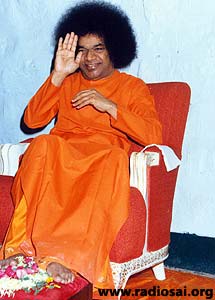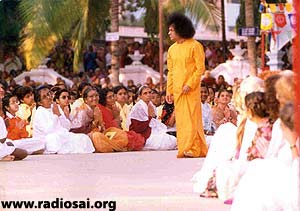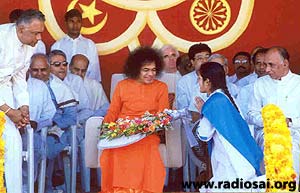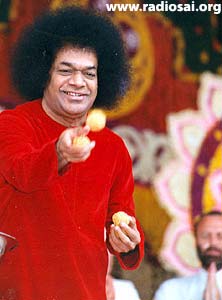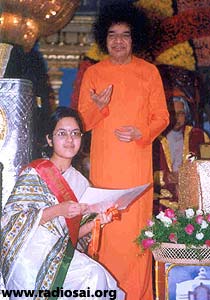 |
 |
 |
Volume
6 - Issue 11
NOVEMBER - 2008 |
My Soulmate and I
Ms. Priya Mani
God - The Strict Task Master Life with Bhagavan is suffused with the profoundest of lessons and the subtlest of transformations. And I have had the rare good fortune of learning life’s lessons from the Divine Master Himself. When I look back on those sepia-tinted lanes of memory, my heart only warms up to the memorable sojourn of the twelve years I have spent at His Lotus Feet - twelve precious years during which Swami taught me lessons that stand me in good stead even today, when I am no longer day after day in His physical presence.
The most important lesson that Swami taught me was the priceless gift of loving Him as an intimate Friend and Companion, verily, my Soul mate. Here’s my tale straight from the Workshop of the Divine Potter. “Bhagavan Sri Sathya Sai Baba is the Master of this House; a silent listener in every conversation and an unseen guest at every meal.” This poster of Bhagavan hung in our house for many years, and every time I passed by this quotation, I could not help but stop to ponder over the unmistakable incongruity between the quote and Swami’s picture. The photo was of a beatific and benign Bhagavan, His right hand raised in a reassuring abhayahastha (posture of blessing). But those words would always stir in my mind the image of a patriarch, senior to my father in age, and of a sterner make; someone who would, unknown to all of us, partake of the meals my mother prepared, yet disapprove of the light, inconsequential chatter that invariably accompanied our gastronomic sessions; someone whose invisible presence loomed larger than life yet incontestable. The quotation would remind me of the God, to whom my brother and I would pray as tiny tots. I was four years of age then and my brother, merely two and a half years old. My mother would spiff up the two of us after bath, and we would accompany our father to the shrine room, where, despite the pantheistic array of the deities, we would address ourselves to the One Supreme, repeating implicitly after our father - God Almighty, Protect us all. This was, perhaps, a pre-schooler’s edition of the Sahanavavatu prayer. And we chanted it without fail everyday, feeling quite pleased with ourselves at the completion of the recital. We had this deep, unshakeable belief that God was ‘watching’ over us, and that He would shower His munificence on us in direct proportion to our good conduct. By the same algorithm, if we transgressed the bounds of permissible unruliness, God would be displeased, even angry. The consequences, then, would be dire, something which we wouldn’t even dare to name.
This concept of a puritanical God chaperoned me even when I joined Swami’s school at Puttaparthi as an eleven year old. But now that I was entrusted to His custody, Swami decided to, first, get my basics right. One of the most important lessons that I learnt at His Lotus Feet was ‘Love for God’. It was more of a process, a slowly yet sure metamorphosis from Daiva Bheeti to Daiva Preeti – doing/not doing a certain thing out of the Fear of God to doing/not doing the same out of Love for God. The first stemmed from Force (bhayam); the second from the Source (bhaavam). And in the idyllic environs of Puttaparthi, Swami brought about in me a fundamental attitudinal change – by making me shed my fears and misgivings towards Him and adopting Him as my Best Friend and Confidant. I do not say that Swami is not an austere disciplinarian. But, in my limited perception of His divinity, I was blinding myself to His other facets. Swami, My Best Friend But Swami was already at work, chisel and hammer, on my young, malleable mind. The change crept in gently, even imperceptibly, as I delved into the different types of bhakti (devotion). I must say that our daily curriculum at Sri Sathya Sai Primary School was such that it made us practice the Navavidha Bhakti (nine forms of devotion) in one form or the other – whether it was Shravanam (listening) in the form of excerpts from the Rama Katha Rasa Vahini/Bhagavatha Vahini/Satyam Shivam Sundaram that our teachers undertook to read, as a more peaceful and useful substitute for the noise that a 500 and odd restless audience of children were capable of generating, or Keerthanam (singing) in the form of evening bhajans.
It could even be an assortment of Archanam, Smaranam and Padasevanam (worshipping, remembrance and serving His feet) as in case of the occasional Sunday Laksharchana, wherein we would offer akshata (holy rice) to a photograph of Swami’s feet, simultaneously chanting His name a hundred thousand times and offering manas pooja (mental worship) to His tender feet. If this weren’t enough, exams brought in their wake, fresh increments of devotion. Needless to say, the intensity and fervour of Vishnusmaranam (remembrance of the Lord) increased when the tests approached. And I am sure we must have amused Swami with our childish attempts at Atmanivedana (surrender to the Lord), when, we invariably prefaced our answer sheets with ‘Swami, write for me’. Swami, for us, took on or, rather, began sharing the duties of Lord Ganesha as the Bestower of Success and Triumph in every sort of enterprise, be it academic or otherwise. Starting with supplicating Him for exams, then unit tests, even inter-house competitions to using His name, ‘Sai Ram’, to express emotions as varied as surprise, fear, relief, exhilaration or exasperation, or even by way of greeting - Swami was slowly and steadily ensuring that we called on Him, knowingly or unknowingly, for every little thing. Meanwhile, I was beginning to discover a Friend who had unobtrusively slipped into my life and grew to be at the receiving end of the day to day account of my life. A sort of a role reversal occurred at this stage. To teach me the fundamentals of Sakhyam (friendship), Swami slid down to Shravanam (listening). I must say that Swami had to (as He does even now) put up with a lot of my talking. For, quite without my knowledge, I began to tell Him in my idle/prayerful moments of my hopes, fears, aspirations, and a hundred other things. And as He would have it, I was beginning to get hooked to carry on a constant, incessant chatter with Him – a sort of an internal dialogue. It was more of a monologue, wherein I spoke and Swami had no choice but to listen.
One moment, it would be Vandanam (obeisance), where I would be all delight and gratitude for Him at having responded to my prayers. At another moment, when I thought He had turned a deaf ear to my pleas, Swami was in for a session of a different kind of Archanam (worship) – wherein after having ventilated my grievances, I would start berating and scolding His photo, then walk away in a huff after the tiff with Him. Tempers cooled, I would return, remorsefully, to my Divine Companion. To me, then, I was sharing my thoughts and feelings with Him as a friend would to another. Not that He needed to be told in order to know. He is privy to every thought, good or bad, the moment it manifests in the mind. Just that my act of telling Him gave me satisfaction and happiness. I wished, I aspired, I prayed. Prayers came in all shapes and sizes. And Swami answered or didn’t answer them. At least that was what I thought. Then came another lesson along the way. I thought my role ended at telling Him things. What I didn’t reflect upon or give thought to much, was the fact that Swami was ‘actually’ listening to everything I had been saying. Bhagavan taught me, in His own inimitable way, that He was not merely listening to whatever I said, but He was also aware of every passing thought and fleeting feeling in my mind. And that, He remembered things which even I had forgotten that I had asked of Him! We May Forget, But The Lord Does Not Ever Here is one such instance. We have the good fortune of hearing Swami discourse in Telugu on festive occasions. But to hear Swami talking to someone on a personal level is an experience in itself. Often Swami switches to the mother tongue of the concerned person. It is a treat to listen to Swami speaking in, what to us, is an unfamiliar language for Swami to use! Wow!
The very idea of having a purely personal conversation with Swami in one’s own language! I always thought the experience as sublime joy that defied description. So I hoped that someday I would be a fortunate recipient of the same. Nurturing this ardent desire, even as a twelve-year-old, I often voiced my thoughts aloud to Swami, “Swami, if You were to talk to me someday, in what language would You converse with me?” There was the big clause ‘if’. But the mind clung on to the glimmer of a hope that, someday, He would talk to me on His own. I even ensured that I was on my best behavior as far as possible, for that would, perhaps, hasten the glorious occasion. But the most important clause was the medium, the language in which I was to relate to Swami, or rather, the vice versa. After all, it was to be a purely personal conversation. So I undertook to decide for Swami the language in which He was to converse with me! Now I considered it highly unlikely that Swami would talk to me in English. Moreover, I thought, it lacked the personal element. So I ruled it out. I did not comprehend Telugu. It was not my mother tongue either. So I forbade Swami from using the same with me. What about my mother tongue? Since I hailed from Palakkad (located in the south Indian state of Kerala), the language that I spoke had a distinct flavor of both Tamil and Malayalam. Now, wasn’t that a bit too hard on Swami to expect Him to use the dialect that I spoke? But I did not want to be partial to one language at the cost of another. So finally, I zeroed in on Hindi to be the exclusive and lucky language for the impending Cosmic Chat! Moreover, I was better conversant with Hindi than even my mother tongue, having spent a good part of my early childhood at Bhopal.
A twelve-year-old’s mind can work in such ingenious ways. Mine too, then, was under the influence of my age. Years sped by. I did have numerous occasions of Sameepyam (Physical Proximity of Swami), but Sambhashanam (Conversation with Swami) was something I wanted Swami to initiate. Moreover, I often found myself tongue-tied in His presence unable to muster the courage to talk to Him! My desire lay buried deep in my subconscious, while my conscious mind was busy tackling a horde of academic and extra-curricular priorities. Then, in my final year of college, I had the unique good fortune of offering a bouquet of flowers to Swami on the behalf of our girls’ campus on the occasion of the Annual Sports and Cultural Meet. A batch mate of mine was also selected to offer the card to Him. I went up the steps of Shanti Vedika and walked up to where Swami was seated, throbbing with delight and anticipation. Swami, who was conversing with a guest, swung a sharp 90 degrees in His rotating chair as I approached, and gave me the most radiant, heartwarming smile. I knelt down, placing the bouquet on His lap. I do not know what elapsed in those few timeless seconds… just the Lord and I…. nothing else existed. I only remember Swami telling me “Leke Jao, Leke Jao” (Take it and go). My batch mate then offered the card to Swami as I waited behind. Swami then blessed the two of us with a magnificent abhayahastha. We came down the steps with the bouquet and the card. A little while later, I asked my batch mate as to what Swami told her. She repeated the exact words Swami had used. Swami had told her “Teeskelli po” (Take it and go), but in Telugu. While, He had conveyed the same to me in Hindi! It then struck me like an epiphany, the long cherished desire of an intimate audience I had sought of the Lord, in the very language that I had stipulated, eight years ago. I had forgotten. Swami had not. He had only bided His time to give me the big surprise. “They Try To Please Me By Giving Up Sweets!” “Bhagavan Sri Sathya Sai Baba is Omnipresent, Omnipotent and Omniscient” is something I had grown up hearing, ever since I joined Swami’s school. In open-mouthed wonder, my little mind would try to fathom these stupendous attributes of God. The ever-merciful Swami taught me the meaning of these words in His unique way. For, He knew and heard everything, and responded too. But, in His time.
Often times, when life begins to resemble the Literature of the Absurd, we feel that God sits watching our plight with total dissociation of sensibility, distancing Himself from the dialogues, monologues and asides of our everyday lives. What we do forget is that He is the Omniscient, albeit unobtrusive, narrator of the drama; that the plot, and the sub-plots are already written replete with flashbacks, rising and falling action, catharsis, discovery and denouement. The resolution may take a while in coming such that we begin to doubt the credentials of His play in terms of unity of action. But whether He is staging a play or scripting a Bildungsroman, Swami has a well-knit story in place which He reveals and resolves at the ‘right’ time, verily like a Deus ex Machina.
I am reminded of a ‘sweet’ experience, that takes me back to my tenth grade, when I was sitting for darshan in the first line with a couple of students. It was a rain-kissed Onam morning and we were seated for special festival blessings. Given the crowds and the programme, it seemed highly unlikely that Swami would even come our way, let alone bless us. But would our hearts give up that easily? Each of us must have been praying to Swami; so was I, coaxing and begging Swami to ordain the winds of chance in our favor. In a moment of desperation, I decided to bribe Him with the lure of a much-loved sweetmeat. “Please, Swami, please,” I pleaded, “If You bless us today, I will give up eating Gulabjamuns for ever.” Even as the mind was engaged in the calisthenics of cajolery, the resounding panchavadyam heralded Swami’s arrival. The programme commenced. Two hours elapsed in this manner. As our good fortune would have it, Swami did come our way and did bless us. As ever, my human mind forgot about the incident, retaining only the memory of the promise made to Him, and this scene evoked every time someone triggered my tingling taste buds with a succulent bowl of gulabjamuns, and I valiantly resisted. Two years sped by. We were in our twelfth grade diligently preparing for our approaching Board examinations. It was the dry and dismal month of March with Swami away at Brindavan. One night, Swami appeared in my dream. I saw Swami seated on a chair in our school lobby, and we students were seated on the floor facing Him. With an ever so slight gesture of the index finger, Swami pointed to one of the students, asking “What is your favorite sweet?” The student replied, “Swami, sohanpapadi.” Swami then posed the same question to another student, to which the response came ‘Badurshahi’. Swami then asked me, “What is your favorite sweet?” I replied, “Swami, Gulabjamun.” The Lord then remarked to the gentleman seated beside Him, “Do you know how foolish some people are? They try to please Me by giving up sweets.” The dream ended there. I woke up delighted and thrilled beyond words. But this was only just the beginning – the start of a lesson Swami was slowly unfolding to me. Later on, during the day, we were greeted in the dormitory with joyous shouts that Swami had sent prasadam (sweet) for us from Brindavan and that we should go downstairs to collect the same. It was Sohanpapadi! “Wow! What a coincidence. Well, well, all’s sweet that ends sweet,” I said to myself, helping myself to the ambrosial confection.
But Swami was in no mood for endings. The next day, He sent prasadam again. This time, it was Badurshahi! This set me thinking. Part One and Two of my dream had found fulfillment. And I was wondering how Bhagavan was going to execute Part Three. Would He dispatch barrelfuls of rosy gulabjamuns to school tomorrow from far-away Brindavan? Inconceivable by all standards of reason!
Yet, I waited in anticipation for the next day. I did not have to wait for too long. For the very next afternoon, as we were plodding away with our books, our Headmistress Aunty walked in with a huge bowl of gulabjamuns she had prepared exclusively for us, the tenth and twelfth grade students. She said we had been slogging too hard, so she had decided to sweeten our labors with a savory surprise! This incident taught me two lessons. One, God defies all definitions of possibility and probability. When He decides to do something (Sankalpa), He will find the ways and means (Vikalpa) to do it. Time and space cannot limit Him and His will. It is we who need to keep our minds and hearts open to receive that Will and Grace. Two, Swami does not desire our paltry offerings by way of giving up a much-desired food item. He doesn’t even need them. What can we give Him but that which does not belong to Him already? We can only offer ourselves to Him, heart and soul, and let Him do His bidding through us. More importantly, Swami was gently reminding me as ever that He was privy to my every thought, word and deed; that ‘Forgetting’ was a word that simply did not exist in the Divine Dictionary! That I would ‘get’ and ‘forget’, but He only ‘gave’ and ‘forgave’. A sound lesson driven home with ‘sweet’ compliments! My Biggest Lesson – Living in His Presence, Always I can only be grateful to Bhagavan for every one of such lessons that He has painstakingly taught me. Especially, for the most precious lesson that He imparted to me – to live in the constant presence of His Divinity. Today, wherever I go, whatever I do, I know that Swami is there with me, feeling my every pleasure and pain, every happiness and sorrow. And wouldn’t He when He “… sits in the bosom of the world and receives all its pangs in His own heart.” He is the compassionate One, He is there to listen to me, share my little joys and delights, comfort and console me when I need Him, and to guide me on the path He would want me to tread – the True Friend that only He can be. Thank you, Swami.
|
Vol 6 Issue 11 - NOVEMBER 2008
|
Best viewed in Internet Explorer - 1024 x 768 resolution. |

